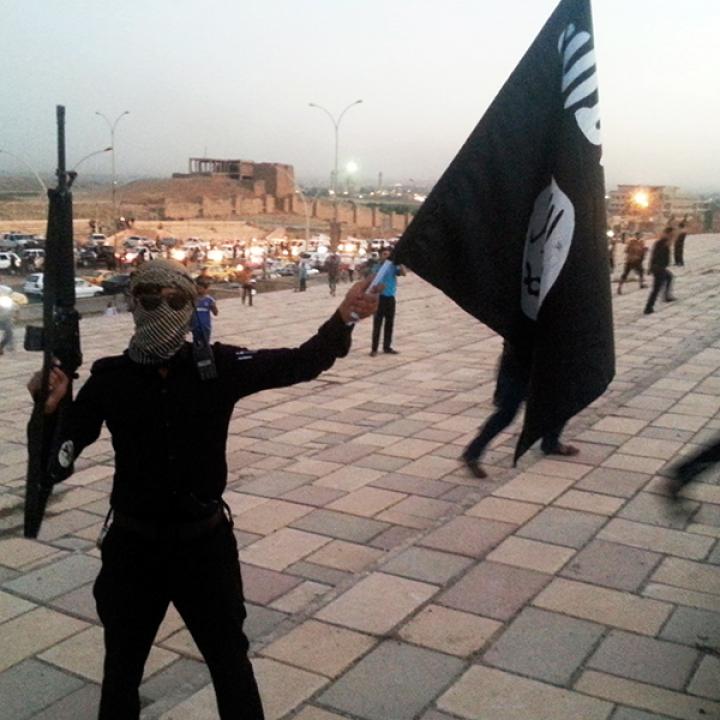

The group's now-formalized annexation model could have direct political and security consequences in several countries, creating a more complex threat environment for the U.S.-led coalition.
This week, Abu Bakr al-Baghdadi, the leader of the Islamic State of Iraq and al-Sham, released a rare public message in which he declared the creation of several new "provinces" in various Arab countries. It was the first time that he and his organization have acknowledged groups that have pledged baya (religiously binding oath of allegiance) to the so-called "Islamic State" since the announcement of its "Caliphate" six months ago. The audio message offers insight into the group's expansion model and its plans for exacerbating religious tensions between Sunnis and Shiites beyond Iraq, Syria, and Lebanon. Whether Western governments want to admit it or not, the reality is that the Islamic State has expanded in a non-contiguous manner outside its base and now has authority over satellite groups and small amounts of territory outside Iraq and the Levant.
FROM GROUPS TO WILAYAT
Since the caliphate announcement in June, a cacophony of different individuals and groups have pledged baya to Baghdadi. Yet in this week's audio message, he only recognized the annexation of jihadist elements in Saudi Arabia and Yemen, along with jihadist groups in Algeria (Jund al-Khilafah), Libya (Majlis Shura Shabab al-Islam), and Sinai (Ansar Beit al-Maqdis). He ignored non-Arab factions based in Pakistan, Indonesia, the Philippines, and elsewhere that have made similar pledges to him. This could suggest tighter links with fellow Arab jihadists, or that the organizations outside the Arab world are not ready for exploitation and growth.
Baghdadi also noted that his declaration entails "nullification" of the local groups in the five places mentioned above, as well as "the announcement of new wilayat (provinces) of the Islamic State and the appointment of wulat (governors) for them." While he claimed to annex these "territories," publicly available information indicates that only the groups in Libya and Sinai can legitimately claim to control land -- the validity of such claims in Saudi Arabia, Yemen, and Algeria remains to be seen.
That said, those groups that do have proven territorial control -- which are now being dubbed Wilayat Libya and Wilayat Sinai -- could follow the same economic model of sustainability that the Islamic State has pursed in Iraq and Syria over the past couple years. If they have not done so already, the Libyan and Sinai groups are prime candidates for fully grafting their jihadist networks onto the traditional criminal enterprise networks that have been used for trafficking, smuggling, and other black market activities over the years. Therefore, these two new "provinces" could have some level of viability, at least in the short term. Questions remain about whether this model can be employed by the Islamic State's new Algerian, Saudi, and Yemeni members, who do not seem to control any territory at this juncture.
TARGETING SHIITES FIRST
In addition to declaring the annexations, Baghdadi made clear to his associates in Saudi Arabia and Yemen that it is time to start an overt military campaign against the rafidah, a derogatory term for Shiites that literally means "rejectionists." He also emphasized the order of priority, stating that jihadists in Wilayat al-Haramayn ("The Province of the Two Holy Places," meaning Saudi Arabia) and Wilayat Yemen should first target Shiites (including the Houthis), then the Saudi dynasty, and then finally the "Crusaders." In doing so, he formally clarified how the Islamic State perceives its enemies and its most immediate threat, while also illustrating its differences from al-Qaeda, an organization that has historically given precedent to fighting the "Crusaders" first.
If the Islamic State's followers in Saudi Arabia or Yemen follow through on this call for a campaign against Shiites, outsiders will be better able to measure the group's true influence and its level of command and control over those outside its base territory. Whatever happens, Baghdadi's message highlights his desire to continue projecting power in new areas. The Islamic State is staying true to its slogan of "remaining and expanding," in part to show the anti-ISIS coalition that while it may not have the same battlefield momentum it had this summer, it is still controlling territory in Iraq and Syria. For the group's leaders and adherents, this is a victory in of itself, supposedly highlighting how the will of God is on their side even as the world is against them.
In the end, the Islamic State's ability to expand its reach and its writ will depend on how successful this now-formalized annexation model proves to be. For now, and perhaps for the long term, this means the U.S.-led coalition will have to deal with a more complex threat environment.
Aaron Y. Zelin is the Richard Borow Fellow at The Washington Institute and founder of the website Jihadology.net.



